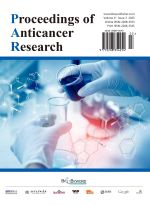Abstract
The integration of Chinese and Western medicine in the treatment of malignant tumors is becoming increasingly widespread. By combining modern medical technology with traditional Chinese medicine, this approach enhances therapeutic efficacy while reducing side effects. This paper reviews the principles and mechanisms of integrated therapy and analyzes its clinical applications and advantages. Studies indicate that this approach is effective in treating common malignancies such as lung, stomach, and liver cancer, especially in slowing tumor progression, relieving symptoms, and improving patients’ quality of life. Chemotherapy combined with Chinese medicine has shown positive effects on survival rates and immune function. However, limitations remain, including insufficient clinical trial data and differences in efficacy across different cancer types, necessitating further high-quality studies. Overall, integrated Chinese and Western medicine offers advantages such as reduced side effects, improved survival rates, and enhanced immune function, providing a comprehensive treatment strategy and a theoretical foundation for its clinical application.
References
Noiri J, Taniguchi Y, Izawa Y, et al., 2024, Pulmonary Tumor Thrombotic Microangiopathy Due to Early Gastric Carcinoma in a Patient with No Antemortem Findings Suggestive of Primary Malignancy. Pulmonary Circulation, 14(1): e12359.
Wang J, Sun R, Yang F, et al., 2024, Technical Specification for Developing a Clinical Practice Guideline for the Integration of Traditional Chinese Medicine and Western Medicine. Journal of Evidence-based Medicine, 17(4): 865–873.
Tian Z, Man Q, Yang Y, et al., 2024, Comparison of Rabbit ATLG and ATG for GVHD Prophylaxis in Hematological Malignancies with Haploidentical Hematopoietic Stem Cell Transplantation. Annals of Hematology, 103(5): 1729–1736.
Zhang K, Xu Y, Chang X, et al., 2024, Co-targeting CD47 and VEGF Elicited Potent Anti-tumor Effects in Gastric Cancer. Cancer Immunology, Immunotherapy, 73(4): 75.
Zhang P, Zhang Q, Li S, 2024, Advancing Cancer Prevention through an AI-Based Integration of Traditional and Western Medicine. Cancer Discovery, 14(11): 2033–2036.
Fan X, McKnight T, Neshiwat J, et al., 2022, Successful Management of Chronic Urticaria and Food Allergies in a Pediatric Population Using Integrative Traditional Chinese Medicine Therapy: A Case Series. Clinical and Molecular Allergy, 20(1): 12.
Soman A, Chikkanna U, Ramakrishna KK, et al., 2022, Integrative Medicine Enhances Motor and Sensory Recovery in Guillain–Barre Syndrome — A case study. International Journal of Yoga, 15(1): 80–84.
Nigam K, Curseen KA, Beaussant Y, 2023, Psychedelics and Related Pharmacotherapies as Integrative Medicine for Older Adults in Palliative Care. Clinics in Geriatric Medicine, 39(3): 423–436.
Mathie RT, 2023, Homeopathy’s Position in the Context of Integrative Medicine. Homeopathy, 112(4): 213.
Ma J, Cruz J, Jin J, et al., 2022, Therapeutics of Integrative Medicine Ameliorate Immunological Disorders of the Nervous System: A Meta-analysis. World Journal of Traditional Chinese Medicine, 8: 153–167.
